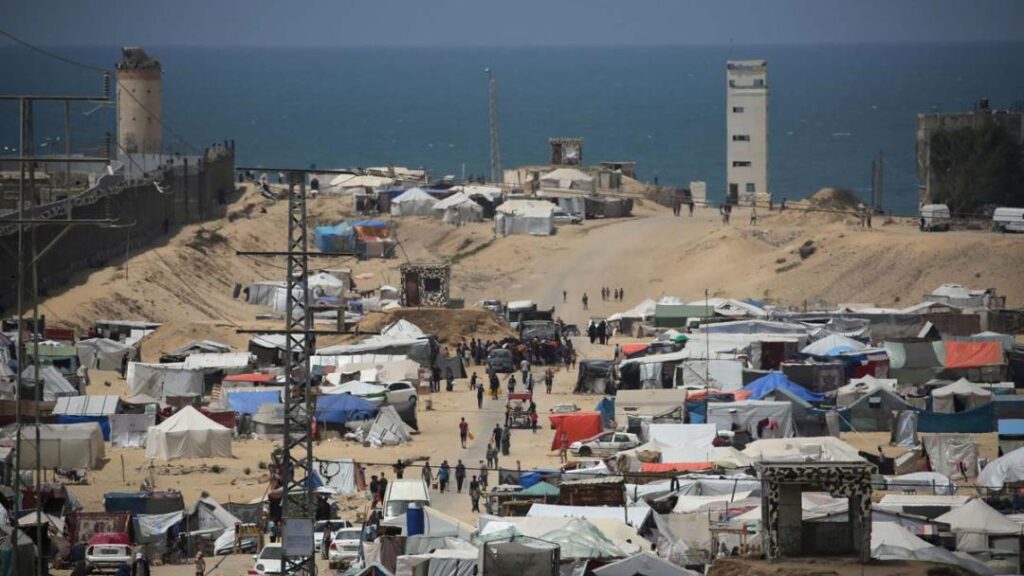Egypt on the Edge: The Gaza War’s Ripple Effects
The ongoing conflict in Gaza has placed Egypt in a precarious situation, as Cairo contemplates the humanitarian crisis developing on its eastern border and its potential domestic spillover. Since the fighting began following Hamas’s 7 October 2023 attack on Israel, Egyptian leaders have been apprehensive about Israeli operations forcibly displacing Palestinians into the Sinai Peninsula, a move they vehemently oppose. Beyond this immediate fear, the conflict has further strained Egypt’s already fragile economy, siphoning off hard currency and exacerbating the hardship faced by Egyptians.
Economic Strain and Diplomatic Manoeuvres
The Gaza conflict has disrupted Egypt’s vital revenue streams, including natural gas exports, tourism, and Suez Canal transit fees. The war’s onset saw Israel suspending gas exports to Egypt and the Houthis’ attacks in the Red Sea escalated shipping costs, significantly impacting canal revenues. Already grappling with high inflation and a ballooning debt crisis, the Egyptian government sought relief from international partners. This led to fresh investments from the European Union (EU), International Monetary Fund (IMF), and Gulf states. A major investment deal from the UAE, which entailed a $35 billion agreement for developing Egypt’s Mediterranean coastline, provided a crucial buffer against economic collapse. However, these financial boosts only offer temporary relief, and the sustainability of this economic bolstering remains uncertain.
Political and Security Concerns
Egypt’s reluctance to accept Palestinian refugees is rooted in both principle and security concerns. Cairo stands in solidarity with the Palestinian cause, and fears of another Nakba—a mass expulsion akin to the catastrophe of 1948—remain potent. Egyptian officials express concerns about militant infiltration that might revive the jihadist insurgency in the Sinai Peninsula, which has been a flashpoint of conflict and instability. Western partners have supported Egypt’s stance against displacement, but the specter of mass migration looms large, especially as military operations by Israel intensify in Gaza’s southern city of Rafah.
Cairo’s Diplomatic Role
Intervening diplomatically, Egypt, along with Qatar, has worked to mediate between Israel and Hamas. Despite Egypt’s diminished regional influence, its strategic geography and historical ties to Gaza make it a key player in negotiating ceasefires and facilitating prisoner exchanges. This mediation underscores Egypt’s indispensable role as a broker of Middle East stability. Nonetheless, the conversation about long-term arrangements for Gaza remains tentative, hinging on the elusive goal of a comprehensive peace deal and the establishment of an independent Palestinian state.
Balancing Acts and International Pressure
International partners have a critical role to play in managing this precarious balance. The EU and the IMF have provided financial aid while advocating for economic and political reforms to ensure Egypt’s long-term stability. These reforms are crucial for fostering a more resilient economy, particularly the leveling of the playing field between state-owned and private enterprises. Gulf states, while moving from donor logic to investment strategies, continue to significantly influence Egypt’s economic trajectory.
Domestic Repercussions and Public Sentiment
The Gaza conflict has resonated deeply within Egypt, fuelling grassroots mobilization in solidarity with the Palestinians. While President Sisi’s government has typically suppressed political expressions, the war has forced them to permit occasional protests, albeit under tight security control. The December 2023 presidential election, held amidst the tumult, saw Sisi comfortably securing another term. However, the repression and lack of competitive political engagement have left many Egyptians, especially younger activists, frustrated and disillusioned.
Outlook and Recommendations
The Gaza war highlights Egypt’s vulnerability to regional instability and economic shocks. Western and Gulf partners should continue to support Cairo while pressing for necessary reforms. Any lasting solution must prioritize ending hostilities and humanitarian relief while implementing structural economic changes to sustain Egypt’s future stability. Additionally, leveraging international diplomatic channels to prevent Palestinian displacement and foster a two-state solution remains crucial.
Conclusion
The intersection of the Gaza conflict with Egypt’s economic and political landscape underscores the urgency for comprehensive international support and reform. Egypt’s role as a mediator remains pivotal, yet its own stability hinges on addressing both immediate humanitarian needs and long-term structural deficiencies. Balancing these elements is essential for ensuring not only Egypt’s resilience but also broader regional stability.
For further details on Egypt’s economic landscape and involvement in the Gaza conflict, visit Egyptian Government’s Official Website.
